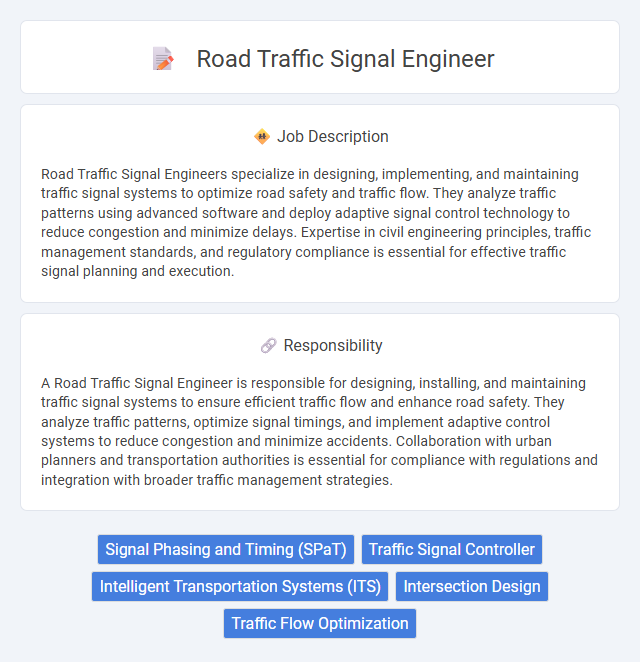
Road Traffic Signal Engineers specialize in designing, implementing, and maintaining traffic signal systems to optimize road safety and traffic flow. They analyze traffic patterns using advanced software and deploy adaptive signal control technology to reduce congestion and minimize delays. Expertise in civil engineering principles, traffic management standards, and regulatory compliance is essential for effective traffic signal planning and execution.
People who demonstrate strong analytical skills and an interest in traffic management are likely to be well-suited for a Road Traffic Signal Engineer role. Candidates with a background in civil engineering, electrical engineering, or related fields may have higher probabilities of success given the technical demands of designing and optimizing traffic signal systems. Those who prefer dynamic problem-solving environments and can handle high-pressure situations might find this job particularly fitting.
Qualification
A Road Traffic Signal Engineer typically requires a bachelor's degree in civil engineering, traffic engineering, or a related field, complemented by professional certifications such as Professional Engineer (PE) licensure or certification from the Institute of Transportation Engineers (ITE). Proficiency in traffic signal design software, knowledge of traffic control systems, and experience with Intelligent Transportation Systems (ITS) are essential qualifications. Strong analytical skills, familiarity with transportation regulations, and the ability to develop and implement traffic signal timing plans enhance effectiveness in this role.
Responsibility
A Road Traffic Signal Engineer is responsible for designing, installing, and maintaining traffic signal systems to ensure efficient traffic flow and enhance road safety. They analyze traffic patterns, optimize signal timings, and implement adaptive control systems to reduce congestion and minimize accidents. Collaboration with urban planners and transportation authorities is essential for compliance with regulations and integration with broader traffic management strategies.
Benefit
A Road Traffic Signal Engineer position likely offers competitive benefits including health insurance, retirement plans, and paid time off to support employee well-being. The role may provide opportunities for professional development and skill enhancement through specialized training and certifications. Employees might also benefit from a dynamic work environment that fosters collaboration and innovation in traffic management solutions.
Challenge
Road Traffic Signal Engineers likely face significant challenges in designing and maintaining efficient traffic flow systems that adapt to rapidly changing urban environments. The complexity of integrating new technologies with existing infrastructure may require frequent troubleshooting and innovative problem-solving. Heightened emphasis on safety and minimizing congestion probably adds pressure to optimize signal timing under varying traffic conditions.
Career Advancement
Road Traffic Signal Engineers play a crucial role in designing, implementing, and maintaining traffic control systems to enhance road safety and efficiency. Career advancement opportunities include progressing to senior engineer roles, project management positions, or specializing in intelligent transportation systems and urban traffic planning. Gaining certifications such as Professional Traffic Operations Engineer (PTOE) and experience with emerging technologies like adaptive signal control can significantly boost career growth and salary potential.
Key Terms
Signal Phasing and Timing (SPaT)
A Road Traffic Signal Engineer specializing in Signal Phasing and Timing (SPaT) develops and optimizes traffic signal plans to improve intersection efficiency and safety. They analyze traffic flow data, design phase sequences, and adjust signal timing intervals to reduce congestion and enhance vehicular and pedestrian movement. Expertise in SPaT technology is critical for integrating advanced traffic management systems and supporting smart city infrastructure.
Traffic Signal Controller
A Road Traffic Signal Engineer specializes in designing, implementing, and maintaining Traffic Signal Controllers that regulate vehicle and pedestrian flow at intersections to optimize traffic efficiency and safety. They work with programmable logic controllers (PLCs) and Intelligent Transportation Systems (ITS) technology to customize signal timings based on real-time traffic data and patterns. Expertise in signal phasing, synchronization, and compliance with national traffic standards is crucial for minimizing congestion and preventing accidents.
Intelligent Transportation Systems (ITS)
Road Traffic Signal Engineers specializing in Intelligent Transportation Systems (ITS) design, implement, and maintain advanced traffic signal technologies to optimize traffic flow and enhance road safety. They integrate adaptive signal control, vehicle detection systems, and data analytics to improve real-time traffic management. Expertise in ITS communication protocols and traffic management software is essential for developing efficient, sustainable urban mobility solutions.
Intersection Design
Road Traffic Signal Engineers specializing in Intersection Design develop and optimize traffic signal systems to improve flow and safety at intersections. They utilize advanced traffic modeling software and analyze vehicle, pedestrian, and cyclist data to enhance signal timing and coordination. Their expertise in geometric design and traffic control devices ensures efficient management of congestion and reduces accident risk at complex junctions.
Traffic Flow Optimization
Road Traffic Signal Engineers specialize in designing and implementing traffic signal systems to enhance traffic flow efficiency and reduce congestion. They analyze traffic patterns, apply advanced algorithms, and integrate adaptive signal control technologies to optimize signal timing and coordination across intersections. Expertise in traffic simulation software and real-time data analysis is essential for improving road network performance and minimizing vehicle delays.
 kuljobs.com
kuljobs.com